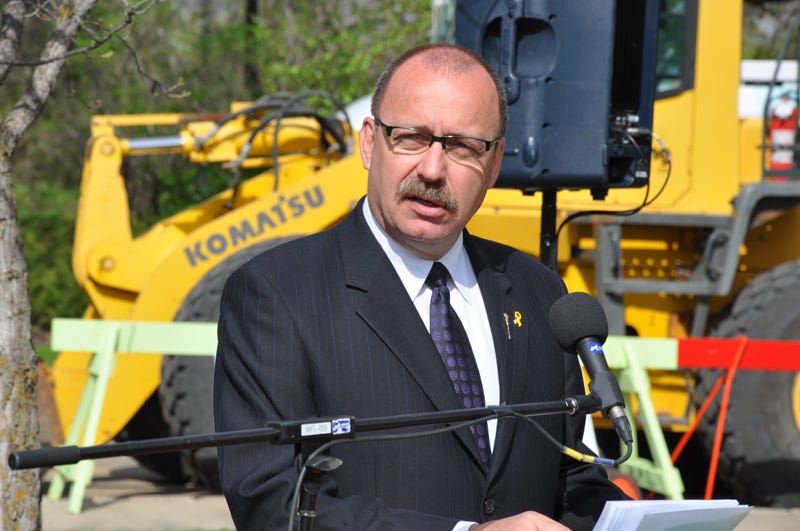Kenney's war on municipalities continues
UCP aims to prevent municipalities from implementing their own public health measures

With the vast majority of remaining public health restrictions lifted as of March 1, Alberta is now in a COVID free-for-all.
But for Alberta’s United Conservative government, lifting all restrictions wasn’t enough. On the same day restrictions were lifted, Premier Jason Kenney announced that he was knee-capping municipalities from developing their own responses to prevent the spread of a virus that is still very much with us, whether we like it or not.
"Something that Albertans do not deserve right now is uncertainty and confusion," he said on Tuesday at a news conference in Red Deer, where he announced the provincial government will update the Municipal Government Act (MGA) to expressly prohibit municipalities from adopting their own public health-related bylaws, such as mask mandates.
Kenney insisted that the government is simply following the data — that cases have significantly trended downward, with a seven-day-average as of Feb. 28 of 835 new cases, compared to a peak of 5,905 at the height of the Omicron wave in mid-January.
Trouble is, there is no accurate data to follow, since PCR tests are only available to “those who have clinical risk factors for severe outcomes and those who live and work in high-risk settings.”
When queried, Kenney repeated his refrain that the media was promoting fear by questioning the wisdom of a nearly-wholesale lifting of restrictions, a line he also used in June last year, when he announced that Alberta was “open for summer.” We all know how that went.
As of Feb. 27, ICU admissions are at 83. Before Kenney announced his summer opening plans leading to the province’s worst COVID wave, they were at 58, reaching a peak of 257 three months later.
Edmonton city council is set to discuss the future of its mask bylaw next week, a move that was characterized by Kenney as a "political virtue-signaling exercise."
But by suggesting an update to the MGA, the premier is putting Edmonton at his crosshairs. Coincidentally, Edmonton is represented at the legislature almost exclusively by NDP MLAs.
On the same day as Kenney’s presser, Municipal Affairs Minister Ric McIver said in a news release that cities have asked the province “to take the lead on public health policy many times in the past, and we are confident now is the right time for everyone in the province to follow the same rules to avoid confusion and frustration.”
The province will take the lead, but only in the abdication of responsibility.
"We certainly shouldn't allow political science to be a substitute for public health science," Kenney said Tuesday, as if that hadn’t been his entire approach to the pandemic.
At the presser, Sammy Hudes, editor of the AB Today newsletter and a former reporter with the Calgary Herald, asked Kenney how he reconciles his past opposition to a “one-size-fits-all approach for a huge, vast diverse province” with his current position.
Kenney said it was different then because we were “in the middle of the pandemic,” as opposed to now, when it’s over, just like it was last summer.
Alberta Municipalities, the organization formerly known as the Alberta Urban Municipalities Association, wasn’t thrilled with Kenney’s announcement.
President Cathy Heron, who is also the mayor of St. Albert, saying in a statement that the organization wasn’t consulted — another familiar pattern with this government — and that this “heavy-handed and unnecessary” legislation will have long-term impacts on municipalities’ ability to govern.
On the same day, University of Calgary political scientist Lisa Young took to Twitter to point to the portion of the MGA that affords municipalities the ability to pass bylaws that ensure “the safety, health and welfare of people.”
But even though this sort of maneuver from the province is wholly within its purview, according to Eric Adams, a law professor at the University of Alberta, it doesn’t mean it’s a good idea.
“Yes, the power exists, but just because a power exists doesn’t mean it should be used,” Adams told Global News, adding that this seems out of character for a government “that spends a lot of time arguing about the importance of local governance, knowledge on the ground, and supposedly promoting local people making decisions about their local interests.
“It’s a little strange to see a province take away [the] power of a city to protect the health of its residents — that is what this province appears to be doing.”
In other news …
Northern Alberta First Nation finds 169 potential unmarked graves
Kapawe'no First Nation, which is located about 370 kilometres northwest of Edmonton, announced Tuesday that they had found 169 irregularities using ground-penetrating radar and drone imagery at the site of the former St. Bernard Mission in Grouard residential school.
Dr. Kisha Supernant, a University of Alberta archeologist who assisted in the effort, said 115 of the potential graves were found at a community cemetery with no grave markers and 54 were found elsewhere on the property.
Abortion pill accessibility an issue for Alberta women
Out of five provinces surveyed, Alberta has the lowest rate of prescriptions for Mifegymiso, a medication that successfully terminates 95% of pregnancies.
Alberta offered 84.47 prescriptions per 100,000 people, compared to 104.08 in Saskatchewan, 109.57 in Manitoba,133.26 in Ontario and 156.3 in B.C.
“I’ve never encountered such profound, overt disdain and misinformation about Mifegymiso, I’ve never experienced that in such large volume,” said Dr. Emma Herrington, a Calgary physician who offers medical abortion prescriptions online for people in rural southern Alberta. “[Pharmacists] didn’t know what the medication was … but then, as soon as they found out it could be used for abortion, many were against that.”
Edited by Ximena González





